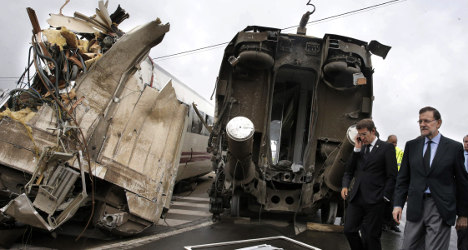Government officials in Galicia, the region where Wednesday's accident occurred, initially said 80 people had been killed and over 100 injured when the train flew off the tracks while reportedly travelling at twice the speed limit.
Galicia police chief Jaime Iglesias, speaking at a news conference in Santiago de Compostela, blamed the discrepancy in the death toll on some remains that were wrongly identified in the initial stages.
Six of the 78 fatalities have yet to be identified.
Forensic police were working with "mangled bodies", he added, some of which where hard to recognize because of the injuries sustained.
An American, an Algerian, a Mexican and a French national were among the dead, local officials said.
Police used DNA samples, dental records and fingerprints and would now also use "other tactics" to identify the remaining six, the head of the Spanish national police force's forensics department, Antonio del Amo, told reporters.
He did not specify what those methods would be. "We will continue to work on it," he said.
Galician Health Minister Rocio Mosquera said among the injured were passengers from eight foreign countries including Argentina, Britain, Colombia, Peru, and the United States.
The US state department confirmed the American death and said five US citizens were injured in the crash.
The Diocese of Arlington in the US state of Virginia named the American fatality as its colleague Ana Maria Cordoba, and on its Facebook page called for prayers for her family.
The train with more than 200 passengers and crew on board derailed on a sharp bend on Wednesday evening, just outside the pilgrimage city of Santiago de Compostela, the capital of Galicia.
Many of the passengers were thought to have been on their way to a religious festival in Santiago, which has now been cancelled.



 Please whitelist us to continue reading.
Please whitelist us to continue reading.
Member comments